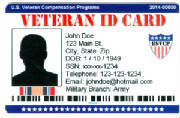|
|
|
|
|
|
Did You Know? What some veterans and family members don’t know is that all non-reimbursed medical costs are deductible in calculating income. For example, for veterans who served during wartime and later became disabled and require aid either at home or in an institution, the VA can provide a pension supplement to bring net annual income up to $20,795 for a single veteran or $24,652 for a veteran and spouse. A veteran with a retirement pension of $50,000 might appear ineligible, but with the fully deductible cost of a doctor-ordered live-in home caregiver running at more than that, the person would be eligible for the full VA pension.
Paying for College The Post 9/11 GI Bill pays institutions of higher learning directly for resident tuition and fees for a public school or at a private school. For a private school, the payment is the lower of either actual tuition and fees or the national maximum per academic year. Veterans who use the Post 9/11 GI Bill are also eligible for a monthly housing allowance, book stipend determined by enrollment and a one-time rural relocation benefit. Attending an out-of-state or private school could lead to out-of-pocket costs, but many schools participate in the VA’s Yellow Ribbon Program to supplement the difference between tuition and benefits so that veterans pay nothing out of pocket. Eligible veterans must have served an aggregate 36 months in active duty after September 10, 2001 or have been honorably discharged from active-duty for a service-connected disability with an aggregate 30 months of service after September 10, 2001. Immediate dependents, included DEERS enrolled spouses and children of service members, may be eligible for a transfer of benefits if the eligible service member is qualified for the Post 9/11 GI Bill at the 100 percent rate.
3 Important Things Veterans Need to Know The $15 billion reform bill to address the crisis of long waiting times for VA appointments became law this month. Here are three things to know about the Veterans’ Access, Choice and Accountability Act, which includes $5 billion to hire more doctors and nurses to solve staffing shortage problems: 1. Some veterans can see a doctor outside the VA system by using a new kind of insurance card. If a veteran tries to schedule an appointment at a VA hospital or clinic but is told the waiting time would be more than 30 days, he or she can either wait or use the new Choice Card to get an appointment from a different provider outside the VA system. Many veterans who live more than 40 miles from a VA hospital or clinic also may use the Choice Cards. Choice Cards should be arriving in veterans’ mailboxes by November 2014. The cards tell providers whom to call to verify enrollment and get billing information. Choice Cards can be used to get health care from:
2. Veterans have more access to mental-health services. In addition to more mental-health care providers and more clinic sites, the law allows military members who were victims of sexual assault to receive counseling and health care at VA facilities. 3. Some surviving spouses can receive a type of GI-Bill benefit. The law gives in-state tuition benefits to surviving spouses of military members who died in the line of duty after September 11, 2001. The law also makes in-state tuition available to veterans under the post-9/11 GI Bill.
Pay It Forward Program Tommy Daniels, owner of Submasters is asking his customers who come to his North Tonawanda restaurant to purchase meals for veterans for the ‘Pay it Forward Program.' “I just thought this was a good way to say to the veterans, thanks for what you have done for us,” Submasters owners Tommy Daniels said. How the program works: “They buy a lunch card, anywhere from $2 to $10 or more. They purchase a ticket and put it on our board. A vet comes in, gets a ticket and comes up with their Veteran ID Card and gets a free lunch,” Daniels explained. Contact Submasters at 716-957-3500. |
|
|
|
|
|
|

